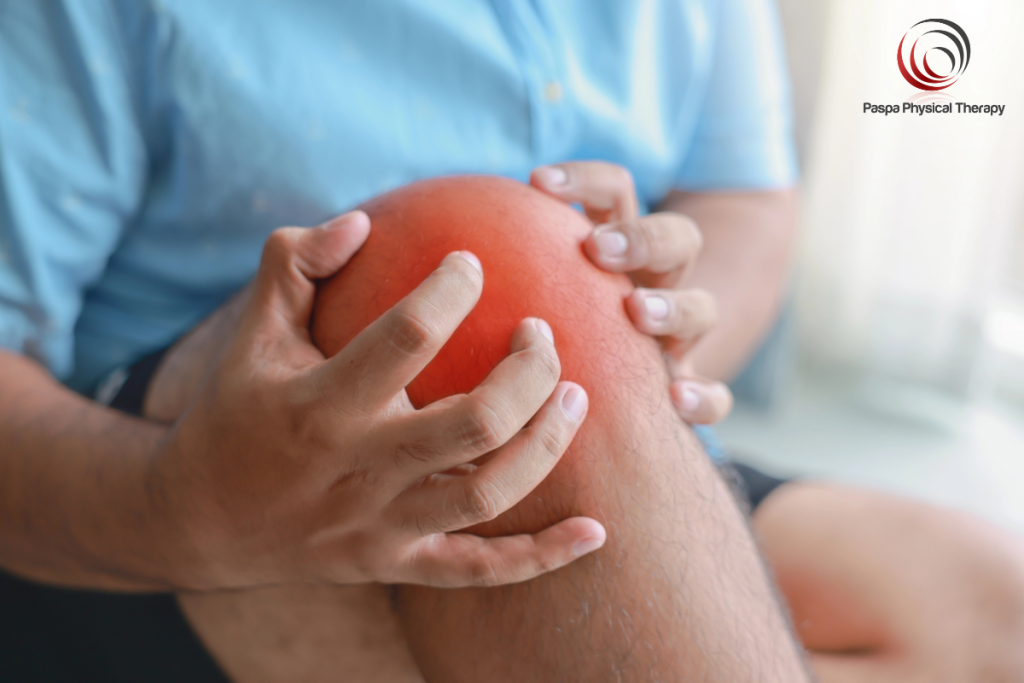Meniscus Tears

A meniscus tear is a common knee injury that can cause pain, swelling, and difficulty moving the joint. Whether it occurs, understanding meniscus tear symptoms is crucial for seeking proper treatment and avoiding long-term damage.
If you’re experiencing knee pain and suspect a meniscus injury, contact our physical therapists at Paspa Physical Therapy in Manhattan, New York. We offer expert, one-on-one care in our fully equipped gym with private treatment rooms for optimal recovery. Book your appointment today!
What is a Meniscus Tear?
The meniscus is a C-shaped piece of cartilage located between the thigh bone (femur) and the shinbone (tibia). Each knee has two menisci—the medial meniscus (inner knee) and the lateral meniscus (outer knee).
These structures serve as shock absorbers, helping to stabilize the knee joint. A meniscus tear occurs when this cartilage is damaged due to twisting motions, sudden impact, or wear and tear over time.
How Do I Know If I Tore My Meniscus?
A torn meniscus can cause various symptoms, which may appear immediately or develop over time. Common meniscus tear symptoms include:
- Pain in the knee, especially when twisting or rotating
- Swelling and stiffness
- A popping sensation at the time of injury
- Difficulty fully straightening or bending the knee
- A feeling of the knee locking or giving out
If you experience these symptoms, seeking an evaluation from an orthopaedic surgeon or a skilled physical therapist is essential to determine the severity of the injury.
What Causes Meniscal Tears?
Meniscal tears can result from several factors, including:
- Sports Injuries – High-impact activities and sudden movements in sports such as football, basketball, and soccer increase the risk of a torn meniscus.
- Age-Related Degeneration – Over time, the meniscus can weaken, making it more susceptible to tears.
- Trauma or Accidents – Direct blows to the knee, such as falls or car accidents, can cause meniscal tears.
- Improper Movement – Squatting, lifting heavy objects, or pivoting awkwardly can lead to a meniscus injury.

How is a Meniscus Tear Diagnosed?
To diagnose a meniscus tear, a healthcare provider will:
- Perform a Physical Exam – Checking for tenderness, swelling, and range of motion. Your doctor may also perform the McMurray test, in which the knee is bent and rotated.
- Use Imaging Tests – An MRI is commonly used to confirm meniscal tears and assess their severity.
Early diagnosis is crucial to determine the best treatment plan and reduce the risk of developing knee arthritis due to untreated damage.
Treatment Options for Meniscus Tears
Treatment for a meniscus tear depends on its severity, location, and the patient’s level of physical activity. Options include:
Conservative Treatment
Many small tears can heal without surgery through non-invasive methods such as:
- Rest and Ice – Reducing activity and applying ice to minimize swelling.
- Medication – Over-the-counter pain relievers can help manage discomfort.
- Physical Therapy – Strengthening the surrounding muscles to improve knee stability and function. Paspa Physical Therapy specializes in one-on-one care, providing customized rehabilitation programs in their well-equipped facility.
Surgical Options
If conservative treatment does not provide relief, meniscus surgery may be necessary. Common procedures include:
- Meniscus Repair Surgery – Suturing the torn meniscus back together, typically for younger, active patients.
- Meniscus Transplant Surgery – In cases where the entire meniscus is damaged, a donor meniscus can be transplanted.
- Meniscectomy – Partial removal of the damaged meniscus to alleviate symptoms.
An orthopaedic surgeon will determine the best surgical approach based on the patient’s needs.
Recovery from a Meniscus Tear
Recovery time varies depending on the severity of the injury and treatment method. For minor tears treated with conservative care, patients can return to normal activities within a few weeks. Surgical recovery may take several months, requiring structured rehabilitation.
Paspa Physical Therapy plays a crucial role in recovery, offering expert guidance through every stage of rehabilitation. Their experienced therapists provide one-on-one care to help patients regain strength, mobility, and confidence in their injured knee.

Get Expert Care for Your Meniscus Injury
If you’re struggling with knee pain from a torn meniscus, professional rehabilitation can make all the difference. At Paspa Physical Therapy, we offer individualized treatment plans in a private, fully equipped facility to help you recover efficiently.
Our experienced team focuses on personalized care—never relying on aides or trainers—so you get the dedicated attention you deserve. Contact our office in NYC today to schedule an appointment!
Our Services
Condition and Injuries We Treat
